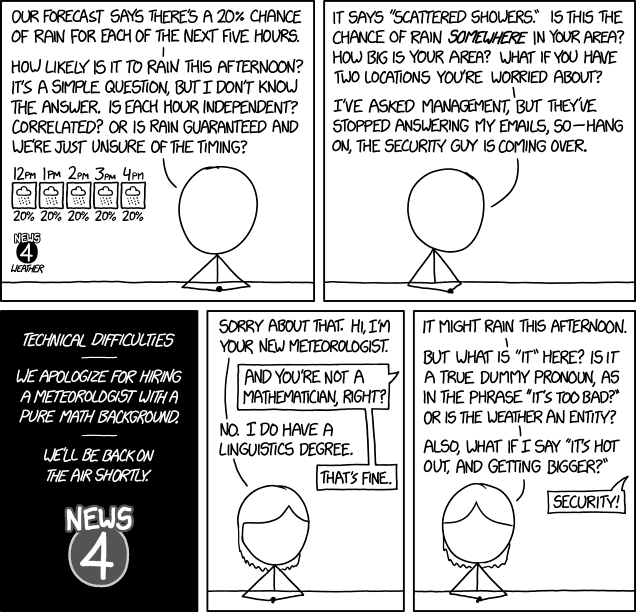Archive for April, 2018
Kanji as commodity
On Friday, April 27, I participated in "Seeking a Future for East Asia’s Past: A Workshop on Sinographic Sphere Studies" at Boston University. Among the participants was Terry Kawashima who talked about the commodification and fetishization of kanji. The following paragraphs are a revised version of a portion of her remarks:
Read the rest of this entry »
All problems are not solved
There's an impression among some people that "deep learning" has brought computer algorithms to the point where there's nothing left to do but to work out the details of further applications. This reminds me of what has been described as Ludwig Wittgenstein's belief in the early 1920s that the development of formal logic and the "picture theory" of meaning in his Tractatus Logico-Philosophicus reduced the elucidation (or dissolution) of all philosophical questions to a sort of clerical procedure.
Several recent articles, in different ways, call into question this modern view that Deep Learning (i.e. complex networks of linear algebra with interspersed point nonlinearities, whose millions or billions of parameters are automatically learned from digital examples) is a philosopher's stone whose application solves all algorithmic problems. Two among many others: Gary Marcus, "Deep Learning: A Critical Appraisal", arXiv.org 1/2/2018; Michael Jordan, "Artificial Intelligence — The Revolution Hasn’t Happened Yet", Medium 4/19/2018.
And two upcoming talks describe some of the remaining problems in speech and language technology.
Read the rest of this entry »
Differing Cantonese and Mandarin readings of the same headline
A Cantonese grad student from Guangzhou sent me this headline that means something very different in Cantonese and in Mandarin:
Mandarin
Érzi shēng xìngbìng, mǔ bèi gǎn ānwèi 儿子生性病,母倍感安慰
("When her son contracted a venereal disease, the mother felt redoubled happiness").
Cantonese
Ji4zi2 saang1sing3, beng6 mou5 pui5 gam2 on1wai3 儿子生性,病母倍感安慰
("[Given that] her son is obedient, the sick mother felt redoubled happiness")
Read the rest of this entry »
Sjushamillabakka
Word of the day from Robert Macfarlane:
Word of the day: “sjushamillabakka” – ‘between the sea & the shore’, i.e. in the shifting space between high & low tide, neither quite water nor quite land. Metaphorically, therefore, a threshold or border realm (Shetland, archaic). pic.twitter.com/dUZDIuHmy8
— Robert Macfarlane (@RobGMacfarlane) April 29, 2018
Read the rest of this entry »
North Korean with a Swiss German accent?
The video embedded in this article features North Korean dictator Kim Jong-un speaking at the historic summit meeting with South Korean President Moon Jae-in at Panmunjom inside the demilitarized zone yesterday:
"Hang on, what language is Kim Jong-un speaking? Livestreaming reveals that the North Korean leader has a unique ‘Swiss-influenced’ accent, a result of his years studying at a German-language boarding school near Bern", Crystal Tai, SCMP (4/27/18).
Read the rest of this entry »
Reconstructing deconstruction
One of the most effective intellectual memes of the past century has been deconstruction — déconstruction in the original French. It recently occurred to me to wonder whether the word, as well as its interpretation, was created by Jacques Derrida, who introduced the contemporary usage in three works published in 1967: twice in La voix et le phénomène (along with two examples of the infinitive déconstruire), three times in L'écriture et la différance, and 14 times in De la grammatologie (along with six instances of déconstruire).
Read the rest of this entry »
Nor does it mean that he doesn't lack negatives
Or does it? Bret Stephens, "Bush 41, Trump, and American Decline", NYT 4/26/2018:
These contrasts don’t mean that Bush was without blemish: As Meacham notes, there were political misjudgments and calculated concessions to ambition on the long path to power. Nor does it mean that Trump doesn’t lack his own kind of strengths, not the least of which is his loudly declared indifference to elite opinion.
My semantic interpreter dies of negation poisoning after about the eighth word of that last sentence. But I think there's one too many negatives in it, since a version with one negative removed seem to mean what Mr. Stephens had in mind to communicate:
Nor does it mean that Trump lacks his own kind of strengths
Read the rest of this entry »
Chinaperson
When I started taking Mandarin in the fall of 1967, one of the first words we learned was "Zhōngguó rén 中國人". A classmate of mine translated that as "Chinaman", provoking our teaching assistant to reprimand him severely, saying that it was a racist term, and to give him a stern lecture about the history of anti-Chinese discrimination in the United States.
Now a West Virginia candidate for the US Senate, Don Blankenship, has fallen into the same trap by referring to the Asian-American father-in-law of Senate Majority Leader Mitch McConnell as a "China person" (see here, here, and here for news reports).
Read the rest of this entry »
The Economist finally comes around
From Lane Greene at The Economist, "The ban on split infinitives is an idea whose time never came," with boldfacing by yours truly:
GEORGE BERNARD SHAW was once so angry with a subeditor that he complained to the newspaper. “I ask you, sir,” Shaw wrote, “to put this man out.” The cause of his fury? The editor had insisted on “correcting” split infinitives. “Set him adrift and try an intelligent Newfoundland dog in his place,” Shaw fulminated, “without interfering with his perfect freedom of choice between ‘to suddenly go’, ‘to go suddenly’ and ‘suddenly to go’.”
This spring a new edition of The Economist’s style guide is published*. Many of its changes are of a kind only a copy-editor would notice; but on an issue that has set teeth grinding for centuries, it marks a sea-change that Shaw would have appreciated. It says infinitives may be split.
While this strikes a blow for linguistic sanity, it is not an unmixed blessing. The Economist's prohibition of split infinitives within its pages has provided a steady supply of topics for blogospheric descriptivists (especially those with the initials "GKP"), who will now have to find something else to write about.
Economist still chicken: botches sentence rather than split infinitive (Geoff Pullum on Language Log)
No-excuses split infinitive in the Economist (Geoff Pullum on Language Log)
To more than justify the split infinitive (Geoff Pullum on Language Log)
At last, a split infinitive in The Economist (Geoff Pullum on Language Log)
Economist Sticklers trying to bug me (Geoff Pullum on Language Log)
Active seeming: dumb grammar fetishism yet again (Geoff Pullum on Language Log)
Rules that Eat Your Brain (Geoff Pullum on Lingua Franca)
The Economist Should Lighten Up and Split Some Infinitives (Geoff Pullum on Slate)
Led astray by the no-split-infinitives fetish (Gabe Doyle on Motivated Grammar)
To offensively split infinitives (Stan Carey on Sentence First)
Syntactic ambiguity of the week
Caitlin MacNeil, "Jackson Considers Withdrawing As VA Nominee As New Allegations Surface", TPM 4/26/2018:
Jackson denied the allegation that he crashed a government vehicle while drunk on Wednesday evening and told reporters he would press on in the confirmation process.
Rain: stochastic processes and dummy pronouns
Today's xkcd:
Mouseover title: "Hi, I'm your new meteorologist and a former software developer. Hey, when we say 12pm, does that mean the hour from 12pm to 1pm, or the hour centered on 12pm? Or is it a snapshot at 12:00 exactly? Because our 24-hour forecast has midnight at both ends, and I'm worried we have an off-by-one error."
I'll leave it to readers to compose the corresponding jokes for economists, physicists, anthropologists, literary theorists, stand-up comedians, and so on.
Read the rest of this entry »
Learn and live
Exercise for readers: Is the order "Live and Learn" motivated by meaning or sound?
Read the rest of this entry »


